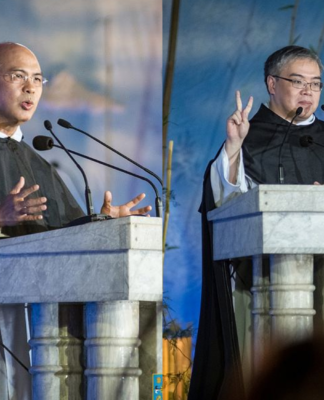IN THE first anniversary of his papacy, the Pope affirmed the Catholic Church moral teachings, clarifying misinterpretations in the mainstream press.
In an interview last March 5 with Corriere della Sera, an Italian news agency, Pope Francis corrected notions that he was about to change Church doctrines.
“The object is not to change the doctrine, but it is a matter of going into the issue in depth and to ensure that the pastoral ministry takes into account the situations of each person,” the Pope said.
Upon his election on March 15, 2013, the Argentine pope envisioned a Church that is humble and prioritizes the needs of the poor.
His unique style of papacy earned for him the titles “People’s Pope” and “Reformer” of the Catholic Church. The first Jesuit pontiff graced the covers of Time magazine and Rolling Stone. Media reports however claimed the Catholic Church was softening its stance on homosexuals, contraception, and divorce.
There is, however, a marked change in tone and pastoral approach.
On the issues of divorce and second marriages, Pope Francis reminded the clergy to accompany those who “experience failure in their marriage,” instead of condemning them.
Cardinal Walter Kasper has suggested an accommodation to allow individuals who have divorced and remarried outside the Catholic Church to receive communion. The Pope wants an in-depth discussion and reflection during the Synod of Bishops on the Family in October.
The Synod will also be reflecting on the Church’s stand against artificial birth control as embodied in Pope Paul VI’s encyclical “Humanae Vitae.”
“We must avoid staying on the surface of the topic. The temptation to resolve each problem with casuistry is an error, a simplification of profound things,” the Pope said in the interview. “It is in the light of this profound reflection that particular situations will be able to be addressed seriously, also that of the divorced.”
Pope Francis also reflected on the possibility of recognizing “civil unions”, while maintaining that marriage should be between a man and a woman.
The change in standards for civil unions in other countries should be seen and evaluated through the diversity of each case, he added.
The Pope defended the Catholic Church against allegations of mishandling cases of sexual abuse by priests. Last February, the United Nations released a report accusing the Vatican of failing to address sexual abuse.
However, the Pope said that the Church has done much to resolve the problem, even during the time of Pope Benedict XVI.
“The Catholic Church is the only public institution that moved with transparency and responsibility. Yet, the Church is the one being attacked,” Francis said.
Church going beyond borders
Pope Francis is set to visit Israel in May. When asked about the possibility of reconciling with the Orthodox Church, the Pope said this could be achieved with unity and cooperation.
“We are all impatient about achieving ‘sealed’ results. The path of unity with the Orthodox means above all walking and working together,” he said. “Orthodox theology is very rich. Their vision of the Church and collegiality is marvelous.”
The Pope also hopes to build a strong relationship with China.
“I sent a letter to President Xi Jinping when he was elected. He responded and the relationship is there. They are a great people whom I love,” the Pope said.
Aside from Asia, Pope Francis is eyeing visits to Africa and Europe. April Joy E. Dy

















